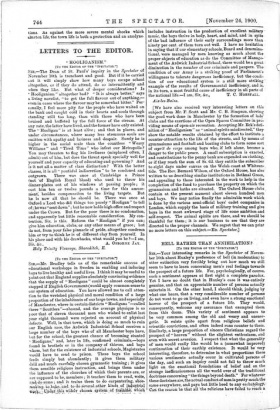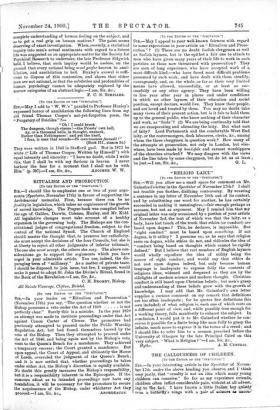HELL RATHER THAN ANNIHILATION ?
[To THE EDITOR OP THE "Serctsroa.") SIR,—Your interesting remarks in the Spectator of Novem. ber 10th about Huxley's preference of hell (in moderation) to utter extinction very forcibly bring out how much we still seem to have to learn concerning men's real feelings towards the prospect of a future life. For, psychologically, of course, such a sentiment appears at first sight a complete paradox. Yet I have no doubt that in Huxley's case it was entirely genuine, and that an appreciable number of persons actually entertain it. On the other hand, I should think, judging by what one hears, that a very considerable number of persons do not want to go on living, and even have a strong emotional horror of the prospect of a future life. They would, consequently, welcome any assurance that exempted them from this doom. This variety of sentiment appears to be very common among the old and weary and unener- getic. It exists quite apart from religious beliefs and scientific convictions, and often indeed runs counter to them. Similarly, a large proportion of sincere Christians regard the prospect of " heaven " without the slightest enthusiasm, and even with secret aversion. I suspect that what the generality of men would really like would be a (somewhat improved) continuation of their earthly existence. It would be very interesting, therefore, to determine in what proportions these various sentiments actually occur in cultivated persons of the day, and such an inquiry could not fail to throw much light on the emotional foundations of belief and on the strange inefficaciousness all the world over of the traditional doctrines concerning "the things beyond death." For whatever these doctrines are, the actual conduct of men is pretty much the same everywhere, and pays but little heed to any eschatology'.'
Can the reason be that all religions have failed to reach a
complete understanding of human feeling on the subject, and co to .get .a• real grip, on human motives?. The point seems deeming of exact investigation. When, recently, a statistical inquiry into men's actual sentiments with regard to a future life was suggested as an appropriate matter for the Society for Psychical Research to undertake, the late Professor Sidgwick held, I believe, that such inquiry would be useless, on the ground that every rational being must prefer heaven to anni- hilation, and annihilation to hell. Huxley's avowal is suffi- cient to dispose of this contention, and shows that either men are not rational, or that the subtleties and profundities of human psychology cannot be adequately explored by the narrow categories of an abstract logic.—I am, Sir, &c.,
F. C. S. SCHILLER.











































 Previous page
Previous page